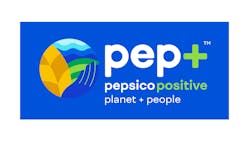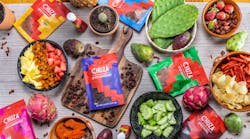PepsiCo announces two new nutrition goals in convenient foods portfolio
PepsiCo Inc. announced two new ambitious nutrition goals as part of PepsiCo Positive (pep+) – the company's end-to-end strategic transformation, which aim to reduce sodium and purposefully deliver important sources of nutrition in the foods consumers are reaching for.
René Lammers, executive vice president and chief science officer for PepsiCo, said in the announcement, “An industrywide approach is necessary to meaningfully reduce sodium intake and introduce important sources of nutrition to help diversify diets. And it’s important for us to take a leadership position to help be a catalyst for change.”
Sodium reduction
PepsiCo aims for at least 75% of its global convenient foods portfolio volume to meet or be below category sodium targets by 2030.
PepsiCo is setting a new sodium reduction goal, with category targets that consider guidance from public health experts including the World Health Organization and are approximately 15-30% lower than the company's current target for key convenient food categories. Its new sodium goal aims for a 15% sodium reduction in its U.S. Lay’s Classic Potato Chips, which would result in a sodium level of 140 mg per 28 g serving.
Diverse ingredients
Increased consumption of diverse ingredients, such as legumes, whole grains, plant-based proteins, fruits and vegetables, and nuts and seeds, can help promote a more nutritionally diverse diet. The company aims to deliver 145 billion portions of diverse ingredients annually in its global convenient foods portfolio by 2030.
Since 2015, PepsiCo has been on a journey to improve its portfolio, charting progress against a set of 2025 nutrition targets, made possible through the efforts of more than 2,600 research and development associates across 13 R&D centers around the world, including:
Innovating on the farm: Agricultural experts partner with farmers to grow potatoes that have the ideal flavor needed to deliver the savory taste consumers enjoy.
Maintaining taste: Seasoning experts identify ingredients and study salt crystal shapes and sizes to optimize flavor while using less sodium.
Creating flavor: Food developers design optimal flavors using seasonings, herbs, spices and dairy that contain less sodium overall.
“We are in a constant cycle of innovation to reimagine the foods we make and how we make them so we can bring better choices to our consumers, without ever compromising on taste,” Lammers added in the announcement. “Consumers enjoy our products more than 1 billion times a day, which provides an opportunity – and the privilege – to have an impact. We set a high bar to improve the nutritional profile of our products, and these new goals reaffirm our ambitions.”









